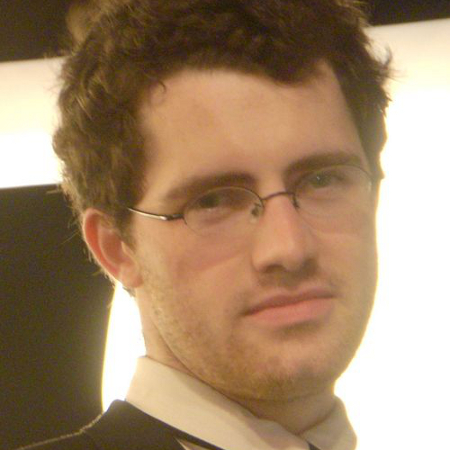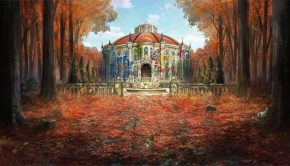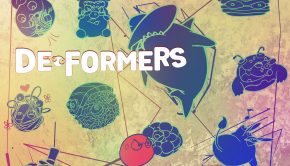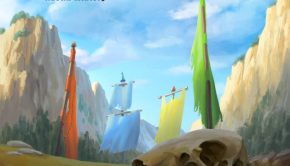Austin Wintory Interview: Closing an Incredible Year
2012 has been a bumper year for Austin Wintory. Since his game score debut in 2006 with thatgamecompany’s flOw, which brought him a BAFTA nomination, Wintory has built up a considerable portfolio of soundtracks for films. However, it was his reunion with thatgamecompany’s Jenova Chan for Journey that marked his breakthrough, as his soundtrack for the indie game received rave reviews, became the highest-charting original game score to date on the Billboard charts, and has since then been performed as part of Video Games Live and East meets West. It has even just received a Grammy nomination.
In this in-depth interview, Wintory traces his collaboration with Jenova Chan and how the close nature of their collaboration shaped both flOw and Journey. Wintory also reflects on how he aspires to give each project a musical identify of its own, what the stylistic inspirations behind his game scores were, and how his latest score Horn became the first mobile game to be scored by a Hollywood studio orchestra.
Interview Credits
Interview Subject: Austin Wintory
Interviewer: Simon Elchlepp
Editor: Simon Elchlepp
Coordination: Simon Elchlepp, Chris Greening
Interview Content
Simon: Austin Wintory, thanks for taking the time today to talk about your work. To start things off, could you give us some information about your musical background and education? It would be particularly interesting to hear how your musical activities during your high school time benefited you later on in your composing career.
Austin Wintory: I began composing shortly after age 10, when I discovered the film music of Jerry Goldsmith. It was a light bulb moment of realizing that composing was actively happening, and with huge amounts of imagination and artistry. That led to the discovery of all sorts of other composers and I was off and running. In high school I was fortunate enough to sort of semi-commandeer the orchestra, so I spent many countless hours conducting and learning in front of those players. I’m actually still friends with a few of them to this day, and those years formed the bed rock of education.

Simon: Your first video game project was thatgamecompany’s flOw. How did your involvement withflOw come about and in how far was your brief impacted by Jenova Chen basing the game on scientific concepts of mental immersion? Your music is absolutely crucial in creating the game’s aesthetic appeal — was the music’s central role always planned right from the start?
Austin Wintory: flOw started as a student project at USC; it was Jenova’s thesis and we met when he went hunting for a composer. I believe the plan was always to make music an integral part of the game design (indeed that’s one of Jenova’s core aesthetics, if you look at Cloud, Flower, and Journey). We discussed Flow Theory and basically just dove in. The core mechanics were worked out while it was still a student project. Later, when Sony picked it up for PS3 release, we’d already done most of the ‘math,’ so to speak, and it became about fleshing out musical choices for the added content (which was primarily done in collaboration with producer Kellee Santiago).
Simon: In an earlier interview, you’ve stated that for flOw, you were going for a sound that was electronic, yet still warm and organic. What was your reason to go with electronics rather than live instruments to create an organic sound, and how difficult was it create synthetic sounds that had the desired timbre for this project?
Austin Wintory: I actually at this point have no memory of Jenova specifically requesting an electronic sound for the score, and yet we never once even flirted with anything else, so he must have! It was novel for me because I come from an orchestral / conducting background, but ultimately it proved to be tremendously stimulating and fun. And difficult, certainly! I created all custom samples, mostly by just corrupting existing instrumental samples I had, and exploring as I went. The goal was always that it feel organic, like an orchestra of instruments you’ve never quite heard before (versus something more purely electronic based on wave synthesis or chiptune-type sounds).
Simon: For flOw, you had to create hundreds of sounds that would interact with the music track, depending on the gamer’s actions. Was this your first experience with creating interactive music and how difficult did you find it to bring the two worlds of sound design and music together? Speaking of which, Journey also features significant overlap between (interactive) sound and music, for example through the shouts that let players communicate with each other. What do you think does this mix of sound design and music add to the player’s experience?
Austin Wintory: flOw is definitely highly interactive as music and sound, to the point that I actually think of the game as more or less a musical instrument that you play via the gameplay. It was my first experience with that sort of thing and, as with the electronic aesthetic, was both hugely stimulating and absurdly difficult. Fortunately by the time I scored Journey, I had played around with these systems enough that the difficulty came in trying to push further, and not from basic unfamiliarity with the premise. I am definitely an advocate for interweaving sound and music as tightly as possible, especially for games like those.
Simon: flOw‘s music is a very ambient work that floats along quietly in the background. How do you modulate the mood of such music without disturbing its function as consistently hypnotic mood-setter? In case you were involved with flOw‘s album release, how do you shape such ambient, strongly interactive music into album tracks with a definite beginning and end?
Austin Wintory: I wanted flOw to be very relaxing and even, yeah, hypnotic. But I actually don’t refer to it as ambient… at least I hope it’s not ambient! But this may be semantics. I define ‘ambient’ as being directionless. The gentle, endless drone of crickets in the night would be an example of true ambience. Musically, even when it’s very subtle and not relying on devices like melody, I never aspire to ambience. I always want the music to be going somewhere. flOw was probably the most subtle development I’ve ever attempted, but in theory if I’ve done my job it’s still in there. As for the album, I did produce it, yes. And because of the immense multi-track nature of the music in-game, to make a linear album I had to basically re-compose the entire score. It was great fun, because I did it something like three years after finishing flOw!

Simon: Some years later, you collaborated again with thatgamecompany on Journey, a project that you mentioned in another interview was more ambitious than flOw and on which you would work for three years. How did this lengthy development period come about and how did it impact your work, both on Journey and on other projects you were involved with during that period? Had the nature of your collaboration with thatgamecompany changed since flOw?
Austin Wintory: Journey was unlike anything else I’ve ever worked on, both with thatgamecompany and otherwise. The sheer timespan was certainly one thing. They hired me from day one, before there was even concept art, much less a playable game. So as a result I was able to write music throughout the development process, reacting immediately to new ideas they were implementing and even in some cases driving their designs through the music. I don’t think that sort of collaboration would have been possible without the friendship and trust first established six years ago on flOw. And yes, I worked on other things throughout the span of Journey, but it was never a struggle to keep it all in balance.Journey was a nice, steady burn. Never slow, and only occasionally in a full-on crunch.
Simon: One of the reasons why Journey has resonated so strongly with listeners is its unabashed melodicism. Why was the decision made to choose a very melody-centric approach and did this help making Journey a satisfying experience for you? How do you decide for yourself if a melody is strong enough — is it a matter of gut feeling and saying ‘this melody works’?
Austin Wintory: Unlike with flOw, from the very beginning Jenova had felt that a central theme of some sort should serve as the anchor for Journey. The piece, called “Nascence” on the album, was written literally on the first day in early 2009. When it came to executing the actual meat of the score, the extent of its melodicism was more or less up to my discretion. Certain parts are more than others, with a definite intent of creating an ebb and flow. How do I know when a melody is strong enough? I have no idea! I never know! Even despite the overwhelming response I’ve gotten to Journey, there’s no reason why I don’t think I could tinker with it and maybe make it better.
Simon: In one of your blog entries on your website, you talk about the role of technique and craft in the process of creating music, and about how to make sure that these technical skills don’t interfere with ‘the spontaneity of expression.’ Would you say then that for you, composing music is mainly an emotional process, while technique and craft are means to pour emotion into musical concrete shape?
Austin Wintory: I think having a strong musical craft is no different than a plumber owning a wide-ranging set of tools. True music isn’t made from the mechanics of craftsmanship in the same way that a plumber doesn’t go to a job site and say “Ok, how can I find an excuse to use my lug nut wrench?” You use your tools to address the situation at hand, and the more tools you have, the better you can execute. In other words, the music must come from within and the training / tools are there to avoid it getting lost in translation. Writing isn’t purely emotional for me, but it is definitely based on listening to honing my instincts.
Simon: Both Journey and your score for Horn are shaped by a main theme that goes through many variations in the course of the game to tell a particular story. What are the narrative arcs that the main themes for these games create create and how long does it take you to create a main theme that is able to carry a score? Is finding the ‘right’ theme the first step of writing a soundtrack and do you sometimes change your themes after the composition process has started?
Austin Wintory: Oh yes, I definitely change things mid-process all the time. In the case of both Hornand Journey, though, I found the central theme very early and leaned on it throughout. The individual cues and variations changed a lot, but that core DNA seemed to never evolve at all. I often like to work that way, and spend a ton of time developing that DNA at the onset.

Simon: One of Journey‘s most striking features are its spiritual overtones, which make for a good part of its emotional impact. Interestingly, this metaphysical streak is also found in the airy choir sounds onflOw and the otherworldly ocarina soli on Horn. What role does this particular musical nuance play on your game scores and does that role differ on flOw, Journey, and Horn? Is it something that you gravitate towards in your writing?
Austin Wintory: I think I’m just a spiritually-oriented composer by nature. Everything I learned about music (music itself, not the craft of it) came from my cousin Sonja Eisenberg, who is a painter in New York. She is a profoundly spiritual person and her paintings, the oils in particular, are probably the purest music I’ve ever encountered. Every time I write, I feel I’m reaching to try and form some sort of web of interconnection between the listeners, the musicians and myself, and I suppose that manifests in different ways each time.
Simon: One of your aims on Journey was to write music that wasn’t tied to any particular ethnic culture to achieve a ‘universal’ sound and meaning. However, you still came up with quite distinct orchestrations that created a specific sound — romantic, but earthy — with the help of rarely used instruments like the serpent. How did you choose the timbres and solo instruments for Journey’s music so that it would appropriately capture the game’s atmosphere? The score ends with “I Was Born For This”, an orchestral ballad — why did you decide to add vocals to the ensemble for Journey‘s finale?
Austin Wintory: The goal with everything (be it a concert work, a film or a game score) is to carve out a little musical universe which is proprietary to that project. This comes in all sorts of forms, but orchestration and timbres are a major part of it, absolutely. “How” I make the choices I do is pretty hard to nail down, though. Certain instruments intuitively have the right feel. For Journey, the game centers very powerfully around the experience of the player, so I wanted a solo instrument to carry the whole thing. I never once considered anything, or anyone, other than Tina Guo and her cello (which we affectionately called CelloGuo). Similarly, for the aria at the end, I knew I wanted something to sort of re-tell the Journey, but cast in a new light. As with Tina, I only ever considered Lisbeth Scott.
Simon: Your latest game score is Horn. You recorded the game’s soundtrack with a Hollywood studio orchestra, a first for a mobile game. How did this orchestral recording for a non-console title come about? Stepping back for a second, do you think that factors like the immense commercial success of Journey’s score and orchestral soundtracks for mobile games like Horn change the playing field for indie game composers and open new doors?
Austin Wintory: Recording Horn was an absolute joy. The producers at Phosphor Games, and in particular Justin Corcoran, were eager to make Horn a full-blown AAA game for the mobile / iOS market, and I am grateful that that translated into enabling me to record as we did. It’s certainly not typical! If this has any impact in creating precedents and enabling other indie composers to reach for higher production values, I’d be deeply honored. That was not the goal, but would be thrilling if it happened!
Simon: Your Bandcamp site mentions that Horn was a ‘remarkably tricky’ score, but also ‘exceptionally fun’. What made the project so interesting to work on and what were the challenging aspects of it? Were they mostly related to the difficulties of working within the confines imposed by a mobile game’s technical limitations?
Austin Wintory: The main challenges were the timeline (just about a month total, including all composing, orchestration, recording and mixing), and also the implementation limitations of working in iOS. Horn is a very sonically rich game; Matthew Grimm (Phosphor’s audio lead) did huge amounts of sound design, and dialogue editing, and so there was a lot of competition for audio bandwidth. We worked really closely to try and maximize every aspect of the sound, but ultimately iOS simply doesn’t support the barrage of multiple streams the way engines like WWise or Sony’s Scream do. So that was tricky to overcome.
Simon: Like Journey, Horn creates a distinct musical world through its instrumentations, this time focusing on light, transparent orchestrations that include several plucked instruments, pre-classical instruments like the viola da gamba, and a Celtic lilt through the use of a penny whistle. What particular mood did you aim to evoke through these creative instrumentations and how do they mirror the world of Horn? In general, what’s the origin of your interest in using such a wide range of quite uncommon instruments in your compositions?
Austin Wintory: Like I said before, I’m always looking to carve out a little home for each work that I do. In this case, I wanted Horn to feel very light on its feet, and so the transparency and generally upper-range instruments was the solution (violin-dominant orchestral strings, flutes / penny whistles, and Cris Gale’s magical ocarina playing). The world Phosphor Games created had such an earthy and organic feel, but in that old European sense (versus the more mystical and semi-eastern feel ofJourney‘s world) and so the Celtic tinge was their idea. They were clear though: they didn’t want a full blown Irish or Scottish score, but more like a taste or overtone of it. So I played around with those colors, but otherwise scored it without any particular ethnic agenda.

Simon: Lastly, the proceeds of several of your albums on Bandcamp support Education Through Music – Los Angeles. Can you give us some information on the aims of this organisation and the reason for your involvement with it?
Austin Wintory: ETM-LA is a very important and special focus in my life. It’s a non-profit organisation based on a model started in New York about 20 years ago, and founded by educator and violinist Victoria Lanier about seven years ago. She asked me to join the board back then, and since then a great handful of other composers and fellow musicians have joined in. I have the wonderful joy of working with people like Michael Giacchino, Chris Lennertz, Chris Young, John Debney, and Tim Davies (an orchestrator and conductor and Grammy-nominated big band leader) among others. Our chairman is the Head of Music Preparation for Disney, Booker White. It’s a phenomenal group.
The goal of ETM-LA is quite simple: to offer children in underserved communities access to music education, which we consider to be a fundamental right and not a privilege. Unfortunately in the US, music education (and the arts in general) have been routinely slashed down or completely eliminated, and the cultural / educational impacts of that have been devastating. When we say we offer “music education,” the most important word there is “education.” The goal is not to create an army of future performers. The goal is to make music equal to that of other subjects, such as math, science, history, reading, etc. Our program is 100% in-school (versus being an after school program) and serves every child within that school (versus an extracurricular or something like that). We currently serve over a dozen schools and about 5,500 students, and constantly growing.
Simon: Many thanks for your time today, Austin Wintory. Is there anything else you’d like to say aboutHorn or your work in general? Do you have any messages to readers from around the world?
Austin Wintory: I only wish to say thank you! If anyone would like to learn more ETM-LA please don’t hesitate to email me or visit the website.
Posted on December 12, 2012 by Simon Elchlepp. Last modified on February 26, 2014.














